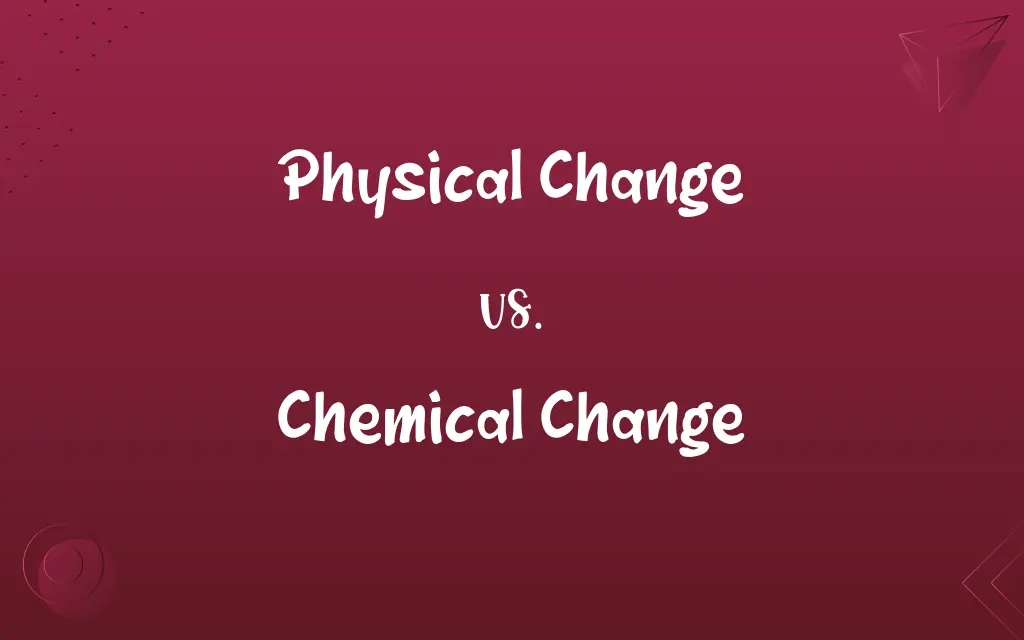Physical Change vs. Chemical Change: Know the Difference

By Shumaila Saeed || Updated on December 25, 2023
Physical Change alters form or appearance without changing substance; Chemical Change transforms substance into new substances.

Key Differences
Physical Change involves a change in the physical properties of a substance, such as shape, size, or state, without altering its chemical composition. Chemical Change, in contrast, results in the formation of new chemical substances, involving a change in the fundamental chemical structure.
Shumaila Saeed
Dec 11, 2023
In a Physical Change, the process is usually reversible, like melting ice into water. Chemical Changes are generally irreversible, as new substances are formed, like rusting iron.
Shumaila Saeed
Dec 11, 2023
Physical Changes do not involve a change in the identity of the substance; ice remains water in solid form. Chemical Changes, however, produce substances with different properties and compositions, like burning wood turning to ash and smoke.
Shumaila Saeed
Dec 11, 2023
Energy changes in Physical Changes are generally less extreme, often involving absorption or release of heat. In Chemical Changes, energy changes are more pronounced, often releasing heat, light, or sound, indicating new substances being formed.
Shumaila Saeed
Dec 11, 2023
Examples of Physical Changes include breaking glass or dissolving sugar in water, where no new substances are created. Chemical Changes include reactions like acid-base reactions or combustion, where the reactants form different products.
Shumaila Saeed
Dec 11, 2023
ADVERTISEMENT
Comparison Chart
Formation of New Substances
Does not form new substances.
Forms new substances.
Shumaila Saeed
Dec 11, 2023
Energy Changes
Less extreme energy changes.
Often involves significant energy changes.
Shumaila Saeed
Dec 11, 2023
ADVERTISEMENT
Physical Change and Chemical Change Definitions
Physical Change
A change affecting the form of a substance, not its chemical nature.
Freezing water into ice cubes is a physical change.
Shumaila Saeed
Dec 04, 2023
Chemical Change
A reaction involving rearrangement of atoms and creation of new bonds.
Digesting food is a chemical change.
Shumaila Saeed
Dec 04, 2023
Physical Change
A reversible change in the physical properties.
Dissolving salt in water is a physical change.
Shumaila Saeed
Dec 04, 2023
Chemical Change
A process where substances transform into different substances.
Rusting of iron is a chemical change.
Shumaila Saeed
Dec 04, 2023
Physical Change
Alteration of a substance without modifying its internal structure.
Tearing paper into pieces is a physical change.
Shumaila Saeed
Dec 04, 2023
ADVERTISEMENT
Chemical Change
Involves breaking and forming of chemical bonds to create new substances.
Mixing vinegar and baking soda, producing CO₂, is a chemical change.
Shumaila Saeed
Dec 04, 2023
Physical Change
A change in state, size, or shape, retaining the substance's identity.
Boiling water is a physical change as it turns to steam.
Shumaila Saeed
Dec 04, 2023
Chemical Change
Chemical Change is marked by energy release, like heat or light.
The combustion of gasoline in an engine is a chemical change.
Shumaila Saeed
Dec 04, 2023
Physical Change
Physical Change involves phase transitions without chemical alteration.
Sublimation of dry ice into CO₂ gas is a physical change.
Shumaila Saeed
Dec 04, 2023
Chemical Change
Change resulting in new chemical products.
Burning wood, which turns into ash and smoke, is a chemical change.
Shumaila Saeed
Dec 04, 2023
Repeatedly Asked Queries
Can Physical Changes be easily reversed?
Generally, yes, like melting and refreezing water.
Shumaila Saeed
Dec 11, 2023
Do Physical Changes produce new substances?
No, they alter form but not the chemical identity.
Shumaila Saeed
Dec 11, 2023
What are examples of Chemical Changes?
Burning, rusting, and decomposing are common examples.
Shumaila Saeed
Dec 11, 2023
What defines a Physical Change?
Alteration of physical properties without changing chemical composition.
Shumaila Saeed
Dec 11, 2023
Is cooking food a Physical or Chemical Change?
It's a Chemical Change as it alters the food's chemical makeup.
Shumaila Saeed
Dec 11, 2023
Are Chemical Changes reversible?
Usually not, as they produce entirely new substances.
Shumaila Saeed
Dec 11, 2023
Can a Chemical Change be identified by a color change?
Often, as color change can indicate new substances are formed.
Shumaila Saeed
Dec 11, 2023
What is a Chemical Change?
Transformation that results in the formation of new chemical substances.
Shumaila Saeed
Dec 11, 2023
Is digestion a Physical or Chemical Change?
Chemical, as it breaks down food into new substances.
Shumaila Saeed
Dec 11, 2023
How does energy play a role in Physical Changes?
Physical Changes involve less dramatic energy changes, like absorption or release of heat.
Shumaila Saeed
Dec 11, 2023
What energy changes occur in Chemical Changes?
They often involve significant energy changes, like release of heat or light.
Shumaila Saeed
Dec 11, 2023
Is boiling water a Physical or Chemical Change?
It's a Physical Change as it only changes state from liquid to gas.
Shumaila Saeed
Dec 11, 2023
Does cutting a fruit constitute a Physical Change?
Yes, it's a physical alteration without chemical modification.
Shumaila Saeed
Dec 11, 2023
How does temperature affect Chemical Changes?
It can speed up or slow down the rate of chemical reactions.
Shumaila Saeed
Dec 11, 2023
Are all phase changes Physical Changes?
Typically, yes, like melting, freezing, and evaporating.
Shumaila Saeed
Dec 11, 2023
Is the rusting of metal a Physical or Chemical Change?
Chemical, because it forms new substances like iron oxide.
Shumaila Saeed
Dec 11, 2023
Are Physical Changes visible?
Yes, but they don't imply a change in substance.
Shumaila Saeed
Dec 11, 2023
Does breaking glass represent a Physical Change?
Yes, because it changes shape without altering chemical structure.
Shumaila Saeed
Dec 11, 2023
Is dissolving sugar in water a Physical or Chemical Change?
Physical, as it's a change in state, not composition.
Shumaila Saeed
Dec 11, 2023
Does a Chemical Change always produce heat or light?
Not always, but it's common in exothermic reactions.
Shumaila Saeed
Dec 11, 2023
Share this page
Link for your blog / website
HTML
Link to share via messenger
About Author
Written by
Shumaila SaeedShumaila Saeed, an expert content creator with 6 years of experience, specializes in distilling complex topics into easily digestible comparisons, shining a light on the nuances that both inform and educate readers with clarity and accuracy.









































































